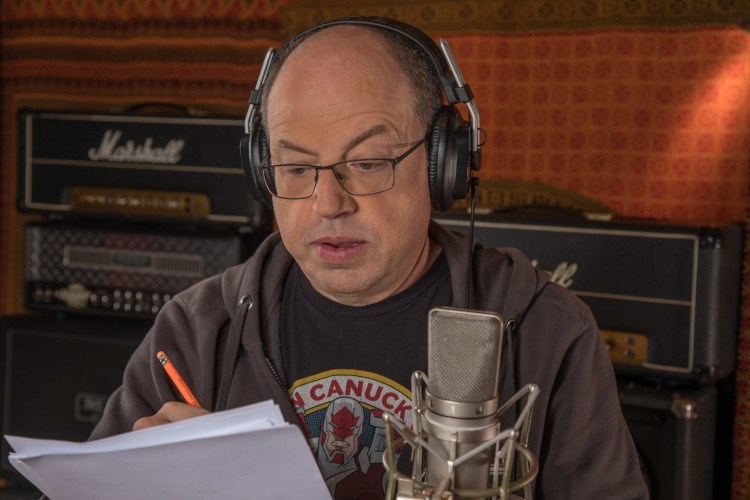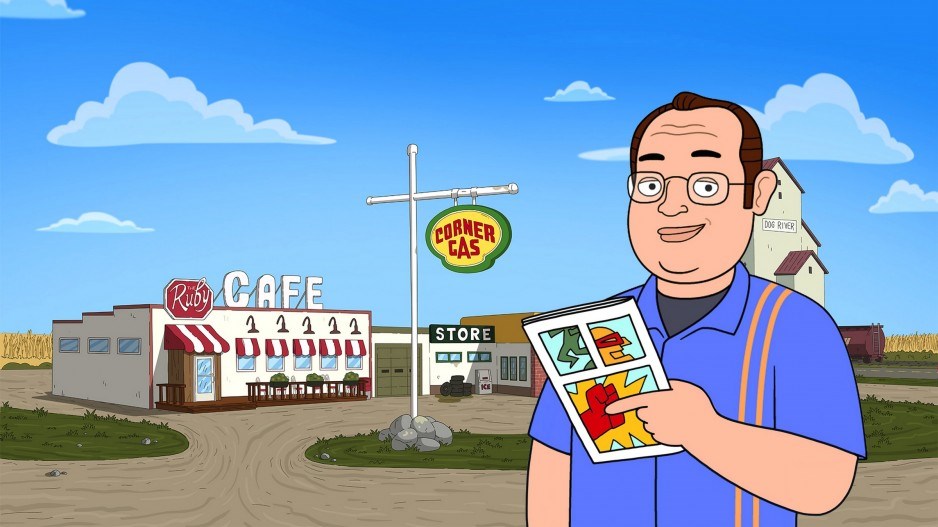Frigid Canadian winters, endless car rides across monolithic prairies – Brent Butt has paid his dues building a career on the road.
“The notion of working at home is always appealing,” said the Vancouver comedian best known as the star and creator of CTV’s Saskatchewan-set Corner Gas.
So when the opportunity arose to turn the quintessentially Canadian comedy into an animated series, Butt campaigned for a writers’ room based in his hometown.
A TV series written in Vancouver is still an anomaly in a city that disguises itself as American locations for shows like The X-Files and Riverdale.
While there have been some exceptions, like CBC’s Da Vinci franchise or the sci-fi fantasy series Continuum, Vancouver has built its reputation as a high-end centre for the service side of the industry.
Most local writers seek out better fortunes in Toronto or Los Angeles.
“The writing is done here, pre-production … and the post[-production] is done here,” Butt told Business in Vancouver ahead of Corner Gas Animated’s April 2 premiere.
He added that he would have preferred to have made the show front-to-back in B.C. but Vancouver’s animation houses were in such high demand that producers had to turn to Toronto for animators.
“The studios here in Vancouver that we were talking to that wanted to do the show were just so busy they couldn’t guarantee our turnaround. They wanted the gig but they couldn’t – they’ve got Steven Spielberg on the phone.”
While Butt spent six seasons on the original Corner Gas honing his TV writing chops before assembling the animated series’ writers in Vancouver, opportunities have been limited for many new to the career.
Last year local writer Wren Handman reached out to a TV industry contact in Toronto to find out why it was so difficult to land a consistent writing gig in Vancouver.

“I need to know what I’m doing wrong. How do I really break in?” Handman recalled thinking.
“And he said, ‘The No. 1 thing you can do to make your career happen is move.’”
Shortly after considering relocating to Toronto, Handman landed a job in the Vancouver writers’ room for a new sitcom pilot from Indian broadcaster Zee, which had set up a production company in Vancouver last summer.
“The core focus was to develop content from scratch to finish over here instead of just using this place as a place to come and shoot for the tax breaks, so the whole focus was very different,” said Subhadarshi Tripathy, senior vice-president of Zee Studios International.
“You do have talented people over here. There is a possibility of getting them but it’s not as brilliantly structured as … [finding] them in L.A. And that’s what’s required over here.”
Zee Studios International is using Vancouver to develop content that would have global appeal, but Tripathy said he’d like to see more.
“If there are good incentives, more and more studios would love to come and get their content developed in Vancouver,” he said, adding B.C. studios like his also need to facilitate writing incubators for young people that would be run by government bodies.
Creative BC, the government agency responsible for promoting the province’s creative sector, has been dipping its toes in funding creative development.
Creative BC struck a deal with the Irish Film Board in fall 2016 to put up matching funds, capped at $30,000 each, to fund development of the TV series The Gulliver Curse.
The government money went towards the cost of polishing the script from Vancouver-based writer Simon Barry, who created Continuum.
Federal Heritage Minister Mélanie Joly announced last September that Ottawa’s new Creative Canada framework would require a $500 million investment from Netflix (Nasdaq:NFLX) to create a new production company to invest “in original production in Canada” over five years.
It’s unclear whether this funding would help assemble writers’ rooms in Vancouver.
“Our creatives, our writers are still getting advice: if you want to make it, you have to leave,” Handman said. “So how many of them are really sticking around?
“But the industry is here, the opportunities are here, and we’re slowly, I think, starting to see people who are trying to invest a little bit more in making Vancouver a full-service stop.”




